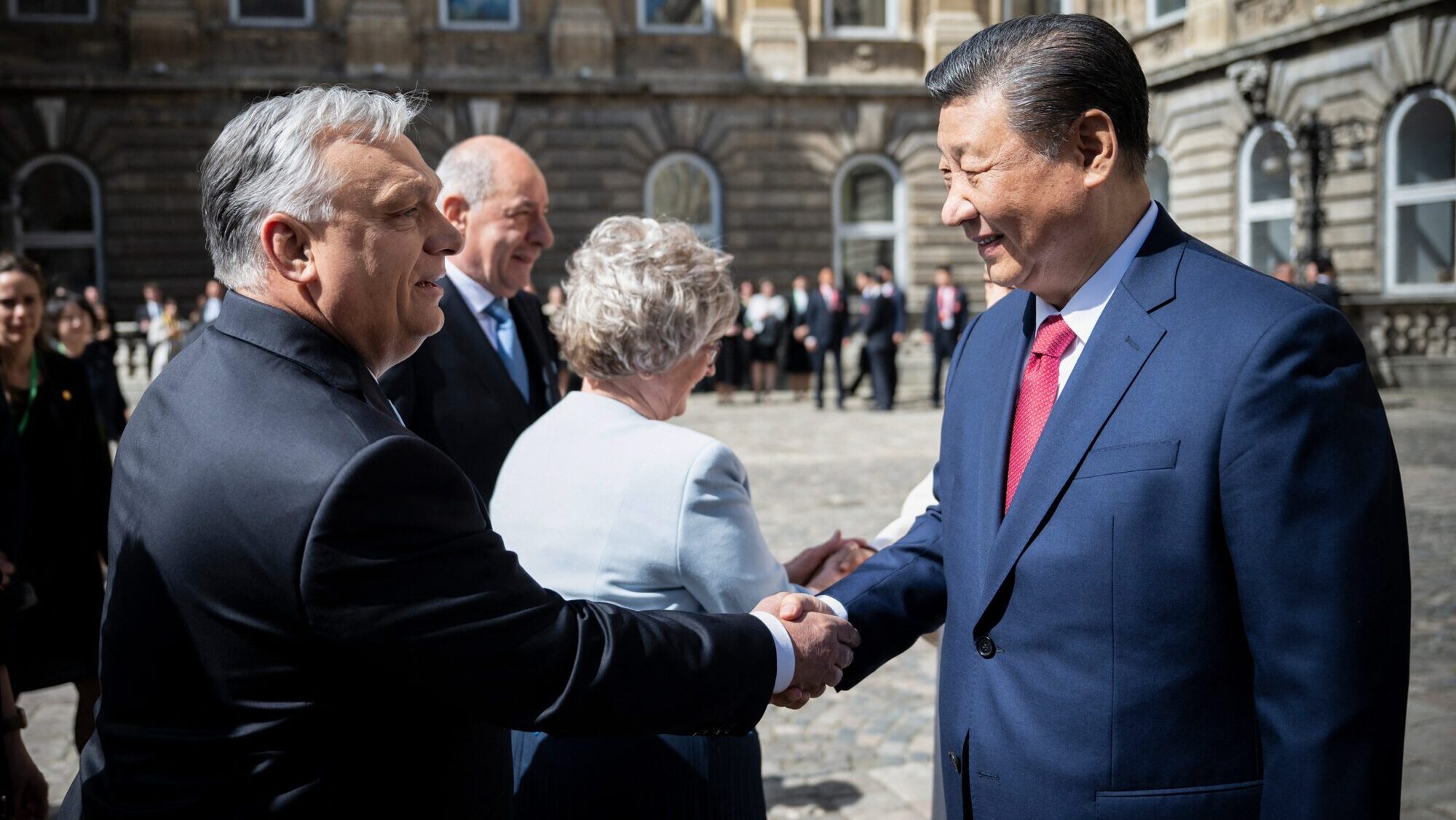
Chinese President Xi Jinping (R) shakes hands with Hungarian Prime Minister Viktor Orban (L) prior to a welcoming ceremony in Buda Castle on May 9, 2024
Photo by Vivien Cher Benko / POOL / AFP
Hungary and China signed eighteen new agreements to deepen their economic cooperation on Thursday, May 9th, in what was hailed as a historic day in their bilateral relationship.
“Hungary will continue to provide fair conditions for Chinese companies investing in our country, and we will create the opportunity for the most modern Western and the most modern Eastern technologies to meet and build cooperation in Hungary,” Hungarian Prime Minister Viktor Orbán said in a joint press conference with Chinese President Xi Jinping. He noted that three-quarters of investments in Hungary last year came from China, and spoke of Beijing’s role in the world’s shifting balance of power. Trade between Hungary and China increased from $3 billion to $12 billion over the past two decades.
Welcome to Hungary, President Xi!🇭🇺🇨🇳 pic.twitter.com/FDIXhAxlu7
— Orbán Viktor (@PM_ViktorOrban) May 8, 2024
China will invest in the development of a freight railway bypass of Budapest and a rail link between the capital and the main airport, as well as the continued construction of a high-speed railway connection between Budapest and the Serbian capital, Belgrade. Hungarian Foreign Minister Péter Szijjártó emphasised that the investments were needed so that products made in Chinese-owned factories in the eastern part of Hungary can be easily accessed in Western European markets.
One of the biggest investors, CATL, is building a €7.3 billion battery plant in the city of Debrecen—Hungary’s largest-ever foreign direct investment. Late last year Chinese BYD, one of the world’s largest electric vehicle manufacturers, announced that it was building its first European plant in southern Szeged. Viktor Orbán’s government hopes Hungary will become a global hub of lithium-ion battery manufacturing.
🇨🇳🤝🇭🇺 In his speech at a joint press conference, @PM_ViktorOrban warmly welcomed President Xi Jinping to Hungary during the 75th anniversary of diplomatic relations between the two nations.
— Zoltan Kovacs (@zoltanspox) May 9, 2024
❗️This visit marked the first trip by a Chinese president to Hungary in two decades.… pic.twitter.com/Vdnfz5ER6I
The agreements, signed on Thursday, also aim to bolster the Chinese Belt and Road Initiative, a trade route which connects China with Central and Eastern Europe through the Chinese-controlled port of Piraeus in Greece. Minister of Foreign Affairs and Trade Péter Szijjártó announced China would also invest in the expansion of Hungary’s electric vehicle charging stations, and the modernisation of border crossings between Hungary and Serbia.
Among other trade deals, Budapest and Beijing will also look for ways on how to cooperate in the field of nuclear energy, a sector Hungary is eager to expand in its attempts to make the economy greener. The country hopes to increase the proportion of nuclear energy within Hungary’s energy mix to 60-70% by the start of the next decade.
Hungary was Xi Jinping’s third and final destination on a European tour that started with France at the beginning of the week, and continued in Serbia. The head of the second largest economy in the world visited Europe for the first time in five years, but while Hungary and Serbia are open to free trade and oppose the EU’s ‘decoupling’ strategy from China, France voiced a much more protectionist view against imports of Chinese goods. In Paris, President Emmanuel Macron and EU Commission chief Ursula von der Leyen pressed Xi Jinping to ensure more balanced trade with Europe and use his influence on Russia to end the war in Ukraine.
On his visit to Budapest Xi said he hoped that Hungary will promote “the steady and sound development of China-EU relations” during its rotating presidency of the EU in the second half of this year.
‘Over the past 75 years, #China and #Hungary have followed the principles of mutual respect. The relationship is now at its best in its history’—said Chinese president Xi Jinping at the press conference following today’s official meeting. pic.twitter.com/cqlo6vS5QL
— Balázs Orbán (@BalazsOrban_HU) May 9, 2024
The two leaders also agreed to promote peace in Ukraine. Xi stressed that China has always been committed to promoting peace talks, and Orbán said he supports all international efforts that seek to bring about a ceasefire and the start of peace negotiations. “Our voice, Hungary’s voice, is a lonely voice in Europe. Europe is supporting war. The only exception is Hungary,” he added, referring to the fact that Hungary has been the only EU state from the beginning of the war to oppose sending weapons to Ukraine.
